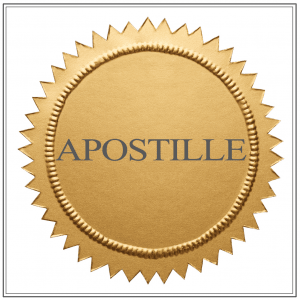How to get a Public Document Apostilled
 There is a good chance you have been asked to get a public document apostilled or authenticated in one of the following situations:
There is a good chance you have been asked to get a public document apostilled or authenticated in one of the following situations:
- You have business dealings in another country; or
- Are immigrating to or seeking a temporary visa in another country.
An apostille is the certification of a public document to verify it is authentic. It can be difficult to obtain while in Canada for these three reasons:
- Canada, along with approximately 40% of all countries, is not officially part of the Apostille Convention that was created in 1961;
- Every participating country has their own process on who and how a public document can be apostilled; and
- Apostilled, authentication and notarization of public documents are NOT the same!
If you need to verify a public document as authentic in a country that is not part of the Apostille Convention, you will have to get it authenticated instead.
Why do I need Documents Authenticated or Apostilled?
Often you need documents apostilled or authenticated to verify one of the following:
- Your identity;
- your work experience; or
- your educational experience
to verify that you qualify for the work or immigration-related application you are submitting.
Apostille vs Authentication vs Notarization
Technically, apostille and authentication mean the same thing. What is different between the two is how and by whom the public document is authenticated.
In some situations, a Notary Public can certify a photocopy to be a true copy of an original. But, this is not how a public document is Apostilled. The document must be apostilled by a Competent Authority in a country that is part of the Apostille Convention.
In some situations, however, the services of a Notary or Commissioner for Oaths might be required so that the Competent Authority can complete the Apostille. But, the Notary or Commissioner for Oath services often, on their own are not enough to get a document apostilled and sometimes may not be required.
Countries vary in how they want a public document authenticated. Let’s start at the beginning.
The Apostille Convention
The Apostille Convention (or Apostille Treaty) is an agreement between 115 countries that specifies how a public document must be verified as authentic so that it may be recognized and used in Apostille countries for legal purposes. The public document must go through a Competent Authority, which varies per country. These roles are mostly filled by Embassies, Ministries, Courts or Local Government officials not Notaries or Commissioner for Oaths. As stated previously, Canada does not participate in this treaty and you can not get a public document issued in Canada apostilled.
Since Canada is not part of the convention, most “officials” including Commissioner for Oaths and Notaries do not understand that they do not have the authority to authenticate a public document or signature when what you require is an apostilled document. That means, they may think that their seal or certification is good enough for your purpose when in fact it may not be because they may not be recognized as a Competent Authority.
The good news is, a country that participates in the Apostille Treaty is not likely to ask you to get a public document issued in Canada apostilled. Instead, they are likely to ask you to get it authenticated. However, if a public document was issued to you from another country, you might need to get it apostilled in that country.
What lead to the creation of the Apostille Convention
In the late 1950’s as world trade grew so did the need to provide documents to other countries for both business and personal reasons. The need for a standardized method of recognizing public documents as authentic was created. The country of origin is responsible for authenticating public documents issued within their own country for use by another country.
What does an Apostille look like?
A stamp or printed form (an ‘Apostille’) is provided by the Competent Authority and validates a public document for used by other countries, while lowering the risk of systematic abuse of the system (i.e. fake credentials or forged documents). An Apostille is a sheet signed by a recognized authority, which includes their official seal, and is attached to a public document verifying it is authentic.
Which documents may be Apostilled?
According to Hague Conference on Private International Law (HCCH), only public documents may be Apostilled by a participating country, such as
Documents issued by:
-
- notaries;
- public institutions;
- local registries / registrars; and
- court houses, tribunals and government officials
Related to:
- court rulings;
- degrees and diplomas;
- business registrations and patents; and
- birth, marriage and death certificates
Please refer to HCCH for more examples of public documents, including limitations and exceptions.
Will Canada join the treaty
Canada has been in talks to join the treaty as of 2015 but we have some hurdles to get through as Canada typically operates under Provincial rules. To sign the treaty all Provinces must agree and getting that done may prove quite difficult and time consuming. Until then, make sure you go through the proper channels to find out exactly what you need.
Will CIC request that I get a document Apostilled?
If you are immigrating to Canada or applying for a student, work or visitor visa, often CIC Canada will only request that you provide documents which have been authenticated—a process that is much easier (and often cheaper) than getting a document apostilled. Ordinarily, they only require public documents be apostilled if coming from a country that is part of the Apostille Treaty and the Canadian government frequently encounters fraudulent documents from that Country.
How to Get an Apostille in Canada
You must obtain specific instructions from the country asking you to get public documents apostilled or authenticated. You will be instructed to have a document:
- apostilled or authenticated if it originated within a participating country; or
- authenticated if it originated within a non-participating country.
Even if a country is part of the Apostille Country, you might not be required to get it apostilled. Our experience is, if the country is part of the Apostille convention but is not ordinarily a refugee-producing country, you are less likely to be asked to get a public document apostilled.
Getting a document Apostilled in a participating country
A list of participating countries and competent authorities can be found here:
Getting a document authenticated in Canada
Contact the authority of the Province where your public document was issued. A list of some of the offices in Canada that may help you are:
Alberta
Deputy Provincial Secretary’s Office
The Government of Alberta
Room 111, The Bowker Building
9833 – 109 Street NW
Edmonton, Alberta
780-427-5069
Website Link Here
British Columbia
Ministry of Attorney General
Order in Council Administration Office
Attention: Authentication Clerk
1001 Douglas Street
Victoria, BC V8W 2C5
250-387-4376
Website Link Here
Ontario
Official Documents Services
Main Floor
222 Jarvis St
Toronto ON M7A 0B6
416-325-8416
Website Link Here
Saskatchewan
Ministry of Justice and Attorney General
Authentication Services
800-1874 Scarth Street
Regina, SK
S4P 4B3
303-787-2951
Website Link Here
PEI
Justice and Public Safety
Legal Services Section
P.O. Box 2000
95 Rochford St., 4th Fl. Shaw S.
Charlottetown, PE
C1A 7N8
902-368-6522
Website Link Here
OTHER PROVINCES:
Not available at this time.
Help with Apostille or Authentication Services
If you would like to hire us to assist you with getting a document apostilled or authenticated, our fee is $125.00 plus disbursements and GST. Please contact our fingerprinting and background department for assistance in this matter.
Canadian Legal Resource Centre Inc.
#204, 4014 Macleod Trail SE
Calgary, Alberta T2G 2R7
403-229-2774
fingerprinting@canadianlegal.org
Do you have Apostille experience?
If you have had public documents apostilled below, please feel free to share your experience and knowledge on the topic below.

